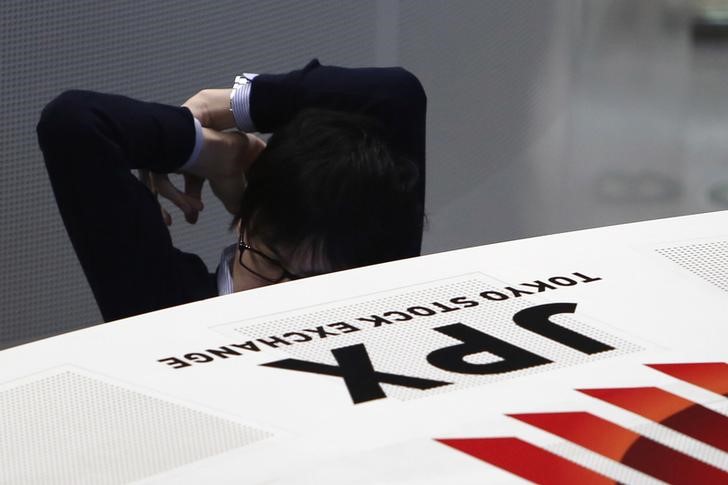By Lisa Twaronite
TOKYO (Reuters) - An index of Asian shares slipped on Monday and Chinese stock markets erased earlier sharp gains made after China's central bank boosted banks' lending power by reducing their reserve requirements.
Financial spreadbetters expected gains in Europe, though the bullish mood was likely to be tempered by the late selloff in Asia. Britain's FTSE 100 (FTSE) was seen to open 35 to 36 points higher, or up 0.5 percent; Germany's DAX (GDAXI) to open 23 to 25 points higher, or up 0.2 percent; and France's CAC 40 (FCHI) to open 12 to 15 points higher, or up 0.2 percent.
China's central bank on Sunday cut the amount of cash that banks must hold as reserves, the second industry-wide cut in two months, adding more liquidity to bolster slowing growth.
MSCI's broadest index of Asia-Pacific shares outside Japan (MIAPJ0000PUS) slumped about 0.9 percent, after rising to a seven-year peak in the previous session. Japan's Nikkei stock index (N225) ended down 0.1 percent, after dropping 1.3 percent last week.
"There's no need for markets to worry too much because of the weakness in global stocks on Friday," said Norihiro Fujito, senior investment strategist at Mitsubishi UFJ Morgan Stanley (NYSE:MS) Securities, who said China's latest step to shore up its economy helped support Japanese shares.
Chinese stock markets rallied earlier in the day, but later turned negative. The CSI300 index (CSI300) was down 1.7 percent, while the Shanghai Composite Index (SSEC) shed 1.7 percent. Hong Kong's Hang Seng (HSI) was down 2.2 percent.
Many investors had been braced for a selloff on Monday prior to the PBOC's move after China's security regulator warned investors to be cautious.
Chinese regulators said on Friday, after mainland markets had closed, that they would allow fund managers to lend shares for short-selling and would also expand the number of stocks investors can short sell, in a bid to raise the supply of securities in the market.
"Over the weekend, regulators gave the market both sticks and carrots, emboldening both bulls and bears," Qilu Securities wrote in a note to clients.
On Friday, major U.S. stock indexes ended with daily and weekly losses over 1 percent, dragged down by the trading regulation changes in China, renewed worries about Greece, and tepid U.S. corporate earnings.
France's central bank chief said Greek banks may soon run out of collateral to access European Central Bank refinancing unless Athens reaches an agreement with the European Union and International Monetary Fund on economic reforms.
The euro slipped about 0.2 percent on the day to $1.0777
The dollar fell about 0.3 percent against its Japanese counterpart to 118.63 yen
The dollar index (DXY), which tracks the greenback against a basket of rivals, was nearly flat at 97.545. The index suffered a 1.8 percent drop last week as disappointing U.S. economic data prompted the market to trim dollar-long positions on fading expectations that the U.S. Federal Reserve would raise interest rates as early as June instead of holding off.
Crude oil was higher, buoyed by the Chinese stimulus action, signs of lower U.S. production and ongoing Middle East turmoil. The leader of Yemen's Iranian-allied Houthi militia accused Saudi Arabia on Sunday of plotting to seize the country.

Brent